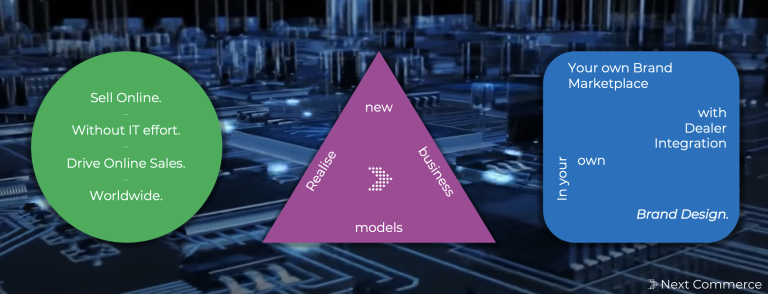A flourishing eCommerce platform ecosystem has been emerging in Europe in recent years. Businesses have to decide whether they want to become marketplace operators or focus their activities on the online selling of their products and services through online shop and marketplaces. Noteworthy amidst these constellations is the emergence of a hybrid shop system that has been establishing itself alongside shop systems such as Shopware, Shopify and Spryker for direct online sales and marketplaces such as Bechtle, Amazon and eBay. Next Commerce enables companies to sell products and services online via direct sales or via integrated sellers – both in the form of digital “Buy Now” offers with an integrated payment functionality.
Strategic B2B marketing focus
Marketing decision-makers have the strategic task of repositioning their brand – via an own online shop and thus engaging in a brand war against their competitors, as tacticians on relevant marketplaces or as an agile challenger, thereby leveraging the advantage of converting customers across all online and offline channels via digital “Buy Now” offers.
Shop systems: Modular or individual solutions
The foundations of online shops are shop systems. A distinction is made between modular shop system and individual shop system solutions. The former is characterised by off-the-shelf web shops which, with an individual touch, enable a fast company-owned online shop solution. Low costs, fast time-to-market and no programming knowledge are required. These are justifiable reasons for this option. Companies can often utilize ready-made API interfaces to popular social media channels from day 1.
Individual shop systems, on the other hand, offer extensive possibilities, functionalities and interfaces to internal company infrastructure, such as ERP, PIM, CRM and WMS systems, to name but a few. More design possibilities for the brand presence under one domain, a wide variety of payment methods and online sales in several countries in different languages are sound reasons for the professional solution. Online marketing, sales and customer data can thus be fully exploited. Especially strong regional and international companies follow this approach to strengthen their existing brand presence and customer relationships. Furthermore, it allows a holistic B2B marketing approach to be fully deployed.

Marketplaces – he who shouts loudest, wins
In recent years, B2B marketers have had to focus their sales efforts also on the so-called “digital department stores”. With high budget investments, businesses would fight to be placed in front of the customer screens with the right product at the best price. Often times, however, companies would seek the expertise of specialised agencies to optimize budget spending. After all, businesses across the globe and many verticals would compete against each other on leading marketplaces that promise the highest turnover potential.
SEO on marketplaces works in the same fashion as the Google search engine – keywords, product texts and images must be constantly adapted and optimised to customer search queries and purchase patterns. With the option of paid advertising, text ads, sponsored products and display ads can be strategically placed to gain more customer views, even on product detail pages on Amazon, for example. On Amazon, an average commission fee of 15% is also charged for every sale – excluding fulfilment. Furthermore, all strategically important KPIs and more importantly, customer loyalty remains with the marketplace operator. Yet, the setup is very fast and the customer reach is exceptionally large.

Hybrid shop system: Convert customers everywhere
The hybrid shop system is an innovation in online sales. Young start-ups like Next Commerce promise a quick setup and maximum flexibility to convert customers across all channels – offline and online. Instead of an online shop with an assigned URL, companies share digital “Buy Now” offers to allow customers to pay online.
Every Buy Now offer is presented in the respective corporate design, includes brand elements, product information, an overview of available sellers as well as an integrated checkout with all relevant global and local payment methods. Accordingly, marketers have the possibility to integrate the corresponding link and QR code to each “Buy Now” offer across their product-related offline and online marketing communication. The unique ability to flexibly transition customers from marketing communication to online buying in an end-to-end brand-controlled customer journey is a powerful toolset at once deposal. And the hybrid approach? The cloud-based hybrid shop system offers marketing and sales to conduct direct sales as well as sales partner integration – focusing on strategic value creation instead of channel conflict. Customers benefit from a seamless brand buying experience with a choice of sellers, currencies and relevant payment methods. And marketers will profit from unrestricted access to marketing performance and customer data, whereas the sales team from transparent partner online sales.
How to successfully sell online:
• Anchoring the corporate brand throughout the customer journey
• Enabling customers to complete a purchase through every channel
• Strategically analyse customer data and consistently apply insights
Conclusion
In today’s world, speed and flexibility constitute the basis of an integrative marketing and commerce approach. The ability to reach customers everywhere and convert them into a compelling brand-tailored customer journey distinguishes the successful business players from the undifferentiated followers. The three B2B shop systems presented here offer proven approaches for small, medium-sized and large enterprises. Keeping the customer central to your marketing and sales concepts will result in a customer-centric outcome – to consistently meet or even exceed customer expectations. This in turn convinces customers to make more than just a plain purchase decision. They become fans.



